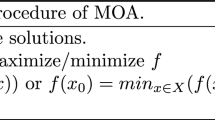Abstract
A two-stage memory architecture and search operators exploiting the accumulated experience in memory are maintained within the framework of a Great DeLuge algorithm for real-valued global optimization. The level-based acceptance criterion of the Great DeLuge algorithm is applied for each best solution extracted in a particular iteration. The use of memory-based search supported by effective move operators results in a powerful optimization algorithm. The success of the presented approach is illustrated using three sets of well-known benchmark functions including problems of varying sizes and difficulties. Performance of the presented approach is evaluated and in comparison to well-known algorithms and their published results. Except for a few large-scale optimization problems, experimental evaluations demonstrated that the presented approach performs at least as good as its competitors.
Similar content being viewed by others
References
Abdullah S, Shaker K, McCollum B, McMullan P (2009) Construction of course timetables based on great deluge and tabu search. In: VIII Metaheuristic International Conference, pp x1–x12
Abdullah S, Turabieh H, McCollum B (2009) A hybridization of electromagnetic-like mechanism and great deluge for examination timetabling problems. In: Sixth international workshop on hybrid metaheuristics, pp 60–72
Abuhamdah A, Ayob M (2009) Hybridization multi-neighbourhood particle collision algorithm and great deluge for solving course timetabling problems. In: Conference on data mining and optimization, pp 108–114
Acan A (2005) An external partial permutations memory for ant colony optimization. In: Proceedings of evolutionary computation in combinatorial optimization-EvoCOP 2005, LNCS 3448, Springer, New york, pp 1–11
Acan A (2004) An external memory implementation in ant colony optimization. LNCS 3172:73–82
Al-Milli NR (2010) Hybrid genetic algorithms with great deluge for course timetabling. Int J Comput Sci Netw Secur 10(4):283–288
Burke E, Bykov Y, Newall J, Petrovic S (2003) A time-predefined local search approach to exam timetabling problems. CRC Press, Boca Raton, pp 76–90
Burke E, Bykov Y (2006) Solving exam timetabling problems with the flex-deluge algorithm. In: Proceedings of the practice and theory of automated timetabling conference (PATAT2006), pp 370–372
Derrac J, Garcia S, Molina D, Herrera F (2011) A practical tutorial on the use of nonparametric statistical tests as a methodology for comparing evolutionary and swarm intelligence algorithms. Swarm Evol Comput 1:3–18
Dueck G (1993) New optimization heuristics: the great deluge algorithm and the record-to-record travel. J Comput Phys 104:86–92
Eshelman LJ (1991) The CHC adaptive search algorithm: how to have safe search when engaging in nontraditional genetic recombination, foundations of genetic algorithms, pp 265–283
Ghatei S, Panahi FT, Hosseinzadeh M, Rouhi M, Rezazadeh I, Naebi A, Ghatei Z, Khajei RP (2012) A new hybrid algorithm for optimization using PSO and GDA. J Basic Appl Sci Res 2(3):2336–2341
Karaboga D, Bark B (2007) A powerful and efficient algorithm for numerical function optimization: artificial bee colony (ABC) algorithm. J Glob Optim 39:459–471
Karaboga D, Akay B (2009) A comparative study of artificial bee colony algorithm. Appl Math Comput 214:108–132
Landa-Silva D, Obit JH (2009) Evolutionary non-linear great deluge for university course timetabling. In: International conference on hybrid intelligent systems, pp 269–276
Li JP, Balasz ME, Parks GT, Glarkson PJ (2002) A species conserving genetic algorithm for multimodal function optimization. Evol Comput 10(3):207–234
Liang Y, Leung KS (2011) Genetic algorithm with adaptive elitist-population strategies for multimodal function optimization. Appl Soft Comput 11:2017–2034
Mahfoud SW (1992) Crowding and preselection revisited, IlliGAL Report, No: 92004
McMullan P (2007) An extended implementation of the great deluge algorithm for course timetabling. In: International conference on computational science-ICCS2007, pp 538–545
Montgomery J, Randall M (2003) The accumulated experience ant colony for the traveling salesman problem. Int J Comput Intell Appl 3(2):189–198
Nahas N, Nourelfath M, Kadi DA (2010) Iterated great deluge for the dynamic facility layout problem, technical report CIRRELT-2010-20. University of Montreal
Ozcan E, Misir M, Ochoa G, Burke EK (2010) A reinforcement learning—great deluge algorithm hyper-heuristic for examination timetabling. J Metaheuristic Comput 1(1):39–59
Pavone M, Narzisi G, Nicosia G (2012) Clonal selection: an immunological algorithm for global optimization over continuous spaces. J Glob Optim 53(4):769–808
Picek S, Jakobovic D, Golub M (2013) On the recombination operator in the real-coded genetic algorithms. In: Proceedings of congress on evolutinary computation-CEC2013, pp 3103–3110
Ravi V (2004) Modified great deluge algorithm versus other metaheuristics in reliability optimization. Asia Pac J Oper Res 21(4):487–497
Shi Y, Eberhart RC, Empirical study of particle swarm optimization. In: Proceedings of the congress on evolutionary computation-CEC 1999, vol 3, pp 1945–1950
Silva D, Orbit JH (2008) Great deluge with non-linear decay rate for solving course timetabling problems. In: International IEEE conference on intelligent systems, pp 11–18
Storn R, Price K (1997) Differential evolution: a simple and efficient heuristic for global optimization over continuous spaces. J Glob Optim 11(4):341–359
Suganthan PN, Hansen N, Liang JJ, Deb K, Chen YP, Auger A, Tiwari S (2005) Problem definitions and evaluation criteria for the CEC2005 special session on real-parameter optimization, technical report, KanGAL Report Number 2005005
Tang K, Li X, Suganthan PN, Yang Z, Weise T (2009) Benchmark functions for the CEC2010 special session and competition on large scale global optimization, technical report, nature inspired computation and applications laboratory, USTC, China. http://nical.ustc.edu.cn/cec10ss.php
Thierens D, Goldberg D (1994) Elitist recombination: an integrated selection and recombination GA. IEEE World Congr Comput Intell 1:508–512
Vesterstrom J, Thomsen R (2004) A comparative study of differential evolution, particle swarm optimization, and evolutionary algorithms on numerical benchmark problems. In: IEEE conference on evolutionary computation-CEC2004, vol 2, pp 1980–1987
Whitley D, Kauth J (1988) GENITOR: a different genetic algorithm. In: Proceedings of the rocky mountain conference on artificial intelligence, pp 118–130
Yao X, Liu Y, Lin Y, Lin G (1999) Evolutionary programming made faster. IEEE Trans EvolComput 3(2):82–102
Author information
Authors and Affiliations
Corresponding author
Additional information
Communicated by V. Loia.
Rights and permissions
About this article
Cite this article
Acan, A., Ünveren, A. A two-stage memory powered Great Deluge algorithm for global optimization. Soft Comput 19, 2565–2585 (2015). https://doi.org/10.1007/s00500-014-1423-5
Published:
Issue Date:
DOI: https://doi.org/10.1007/s00500-014-1423-5




